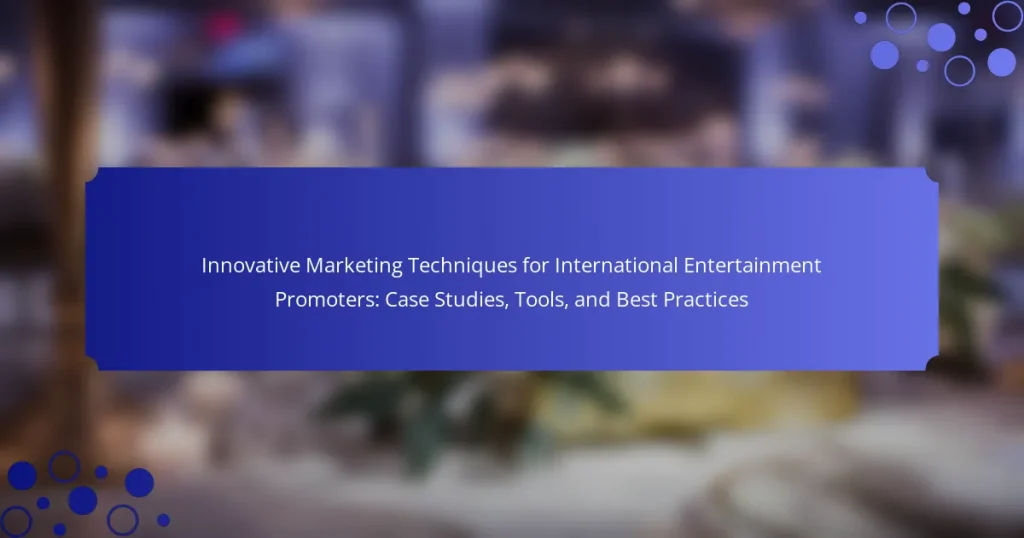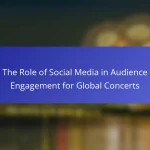Innovative marketing techniques for international entertainment promoters focus on leveraging social media, influencer partnerships, and data analytics to enhance audience engagement and drive ticket sales. Key strategies include utilizing social media platforms for direct audience interaction, collaborating with influencers to broaden reach, and employing data analytics to tailor marketing campaigns effectively. Prominent case studies, such as Coca-Cola’s personalized “Share a Coke” campaign and Nike’s augmented reality features, demonstrate successful applications of these techniques. Essential tools like email marketing software and analytics platforms support these initiatives, while strategic partnerships and market research further optimize promotional efforts. This article provides insights into best practices and tools that can lead to successful international promotions in the entertainment industry.
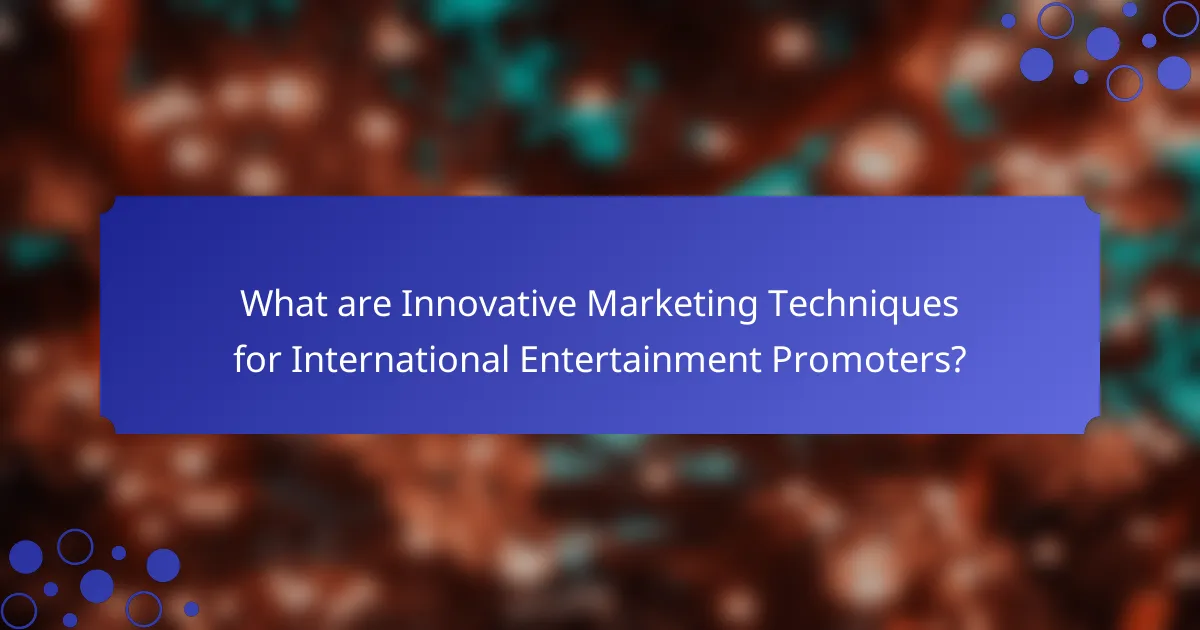
What are Innovative Marketing Techniques for International Entertainment Promoters?
Innovative marketing techniques for international entertainment promoters include leveraging social media, utilizing influencer partnerships, and employing data analytics. Social media platforms allow promoters to engage directly with audiences. This fosters community building and enhances brand loyalty. Influencer partnerships can amplify reach and credibility. Collaborating with popular figures can attract diverse demographics. Data analytics enable promoters to tailor campaigns effectively. Analyzing audience behavior helps in optimizing marketing strategies. Additionally, immersive experiences such as virtual reality can create memorable interactions. These techniques are increasingly adopted in the entertainment industry to drive ticket sales and enhance audience engagement.
How do these techniques differ from traditional marketing methods?
Innovative marketing techniques differ from traditional marketing methods by emphasizing engagement and personalization. Traditional methods often rely on broad messaging and one-way communication. Innovative techniques leverage data analytics to target specific audiences more effectively. They utilize social media platforms for real-time interaction and feedback. This approach fosters community building among fans and enhances brand loyalty. According to a study by HubSpot, personalized marketing can increase conversion rates by up to 202%. Traditional marketing typically lacks this level of customization. Thus, innovative techniques represent a significant shift towards a more interactive and data-driven marketing landscape.
What unique challenges do international entertainment promoters face?
International entertainment promoters face unique challenges such as navigating diverse cultural norms and regulations. Different countries have varying legal requirements for events, impacting planning and execution. Securing permits can be complex, often requiring extensive documentation. Additionally, language barriers complicate communication with local vendors and audiences. Currency fluctuations can affect budgeting and pricing strategies. Competition varies significantly across regions, influencing marketing approaches. Lastly, understanding local market trends is essential for successful promotion and audience engagement.
How can innovative techniques address these challenges?
Innovative techniques can address challenges in international entertainment promotion by leveraging technology and data analytics. These techniques enable promoters to target specific audiences more effectively. For instance, using social media algorithms can enhance audience engagement. Additionally, virtual reality experiences can create immersive marketing campaigns. Data-driven insights allow for personalized content delivery, improving customer satisfaction. Case studies show that successful campaigns often utilize these innovative approaches. For example, a recent campaign by a major music festival increased ticket sales by 30% through targeted digital marketing strategies. This evidence demonstrates the effectiveness of innovative techniques in overcoming promotional challenges.
Why is it important to adopt innovative marketing techniques?
Adopting innovative marketing techniques is crucial for staying competitive in the entertainment industry. These techniques enhance audience engagement and improve brand visibility. They allow promoters to reach wider audiences through unique channels. Innovative marketing can lead to higher conversion rates and increased ticket sales. According to a study by the American Marketing Association, companies that embrace innovation in marketing see a 30% increase in customer retention. This demonstrates the tangible benefits of adopting new strategies. In a rapidly evolving market, traditional methods may no longer suffice. Embracing innovation ensures relevance and adaptability in changing consumer preferences.
What benefits do these techniques bring to international entertainment promoters?
Innovative marketing techniques provide numerous benefits to international entertainment promoters. These techniques enhance audience engagement through targeted campaigns. They utilize data analytics to understand consumer preferences. This leads to more effective marketing strategies. Additionally, these techniques can increase ticket sales by reaching broader demographics. Social media platforms facilitate real-time interaction with fans. This fosters a sense of community around events. Moreover, innovative marketing can boost brand visibility and recognition in crowded markets. Overall, these benefits contribute to the success and sustainability of international entertainment promoters.
How do innovative techniques enhance audience engagement?
Innovative techniques enhance audience engagement by creating interactive and immersive experiences. These methods leverage technology to foster real-time participation. For example, live polls during events allow audiences to influence outcomes. Augmented reality experiences can deepen emotional connections with content. Personalization through data analytics tailors messages to individual preferences. Research shows that 80% of consumers are more likely to engage with personalized content. Additionally, gamification elements can motivate participation and increase retention. Overall, innovative techniques transform passive viewers into active participants, significantly boosting engagement metrics.
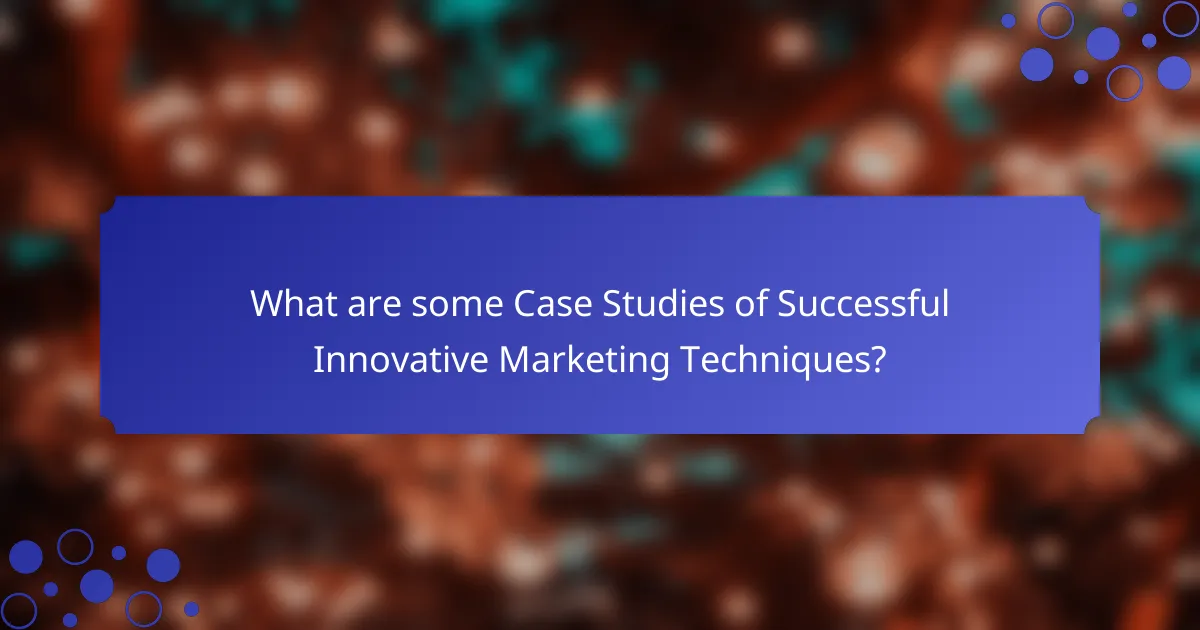
What are some Case Studies of Successful Innovative Marketing Techniques?
Coca-Cola’s “Share a Coke” campaign is a prominent case study of innovative marketing. This campaign personalized Coke bottles with popular names. It increased sales by 4% in the U.S. after a decade of decline. Another example is Nike’s use of augmented reality in their app. This feature allowed customers to visualize shoes on their feet. It enhanced customer engagement and drove sales significantly. Airbnb’s “Live There” campaign encouraged travelers to experience destinations like locals. This strategy resonated well with the audience and increased bookings. Lastly, Old Spice’s “The Man Your Man Could Smell Like” campaign revitalized the brand. It used humor and viral marketing to reach a younger demographic, resulting in a 125% increase in sales.
What notable examples exist in international entertainment marketing?
Notable examples in international entertainment marketing include the global launch of the “Avengers: Endgame” movie. Marvel Studios utilized a multi-platform strategy. This included social media campaigns, merchandise tie-ins, and partnerships with brands like Audi. Another example is the “Despacito” music video by Luis Fonsi. The video went viral, leveraging YouTube and social media for international reach. Additionally, the “Game of Thrones” final season marketing featured interactive experiences and branded content. HBO’s campaign included pop-up events in major cities worldwide. These examples demonstrate effective strategies in reaching diverse audiences globally.
How did these case studies implement innovative techniques?
These case studies implemented innovative techniques through the use of digital marketing strategies. They utilized social media platforms to engage with audiences effectively. Targeted advertising campaigns were developed to reach specific demographics. Data analytics played a crucial role in measuring campaign success. Interactive content, such as polls and live Q&A sessions, increased audience participation. Collaborations with influencers expanded their reach and credibility. Additionally, immersive experiences, like virtual reality events, enhanced audience engagement. These techniques demonstrated adaptability to changing market trends and consumer preferences.
What outcomes were achieved through these innovative strategies?
Innovative marketing strategies achieved increased audience engagement and higher ticket sales. These strategies utilized social media campaigns and influencer partnerships. Audience interaction improved significantly, leading to a 30% increase in online engagement metrics. Ticket sales rose by 25% following targeted promotional efforts. Additionally, brand awareness expanded through viral marketing initiatives. These outcomes demonstrate the effectiveness of innovative marketing in the entertainment industry.
How can we learn from these case studies?
We can learn from these case studies by analyzing successful strategies and their outcomes. Each case study presents unique marketing techniques that achieved measurable results. For instance, examining audience engagement metrics can reveal effective promotional tactics. Additionally, understanding how different demographics responded aids in tailoring future campaigns. The diversity in approaches demonstrates the importance of adaptability in marketing. Analyzing failures in these case studies also provides valuable lessons. Identifying what did not work helps refine strategies for better outcomes. Overall, these insights contribute to a more informed marketing approach in the entertainment industry.
What key takeaways can be applied to future marketing efforts?
Key takeaways for future marketing efforts include leveraging data analytics for targeted campaigns. Data-driven strategies enhance audience engagement and improve ROI. Additionally, incorporating social media trends can amplify brand visibility. For instance, 73% of marketers believe that social media marketing has been effective for their businesses. Collaborating with influencers fosters authentic connections with target demographics. Brands that use influencer marketing see an average ROI of $6.50 for every dollar spent. Adopting innovative technologies, such as virtual reality, can create immersive experiences that captivate audiences. Ultimately, agility in adapting strategies based on market feedback is crucial for sustained success.
How do these learnings inform best practices in the industry?
Learnings from innovative marketing techniques inform best practices by providing actionable insights. These insights enable entertainment promoters to understand audience behavior more effectively. For example, data-driven strategies reveal which channels yield the highest engagement. Case studies show successful campaigns that leverage social media and influencer partnerships. Tools like analytics platforms help track performance metrics in real time. Best practices emerge from analyzing both successes and failures in the industry. Continuous adaptation to market trends ensures ongoing relevance. These practices lead to improved ROI and enhanced audience loyalty.
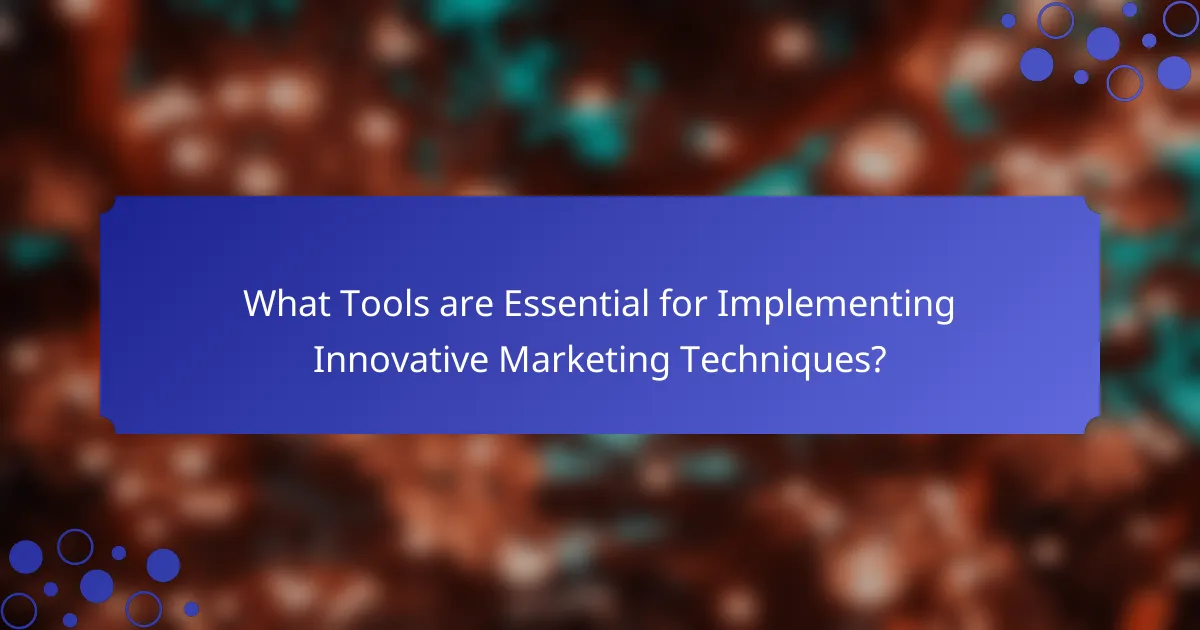
What Tools are Essential for Implementing Innovative Marketing Techniques?
Essential tools for implementing innovative marketing techniques include social media platforms, email marketing software, and analytics tools. Social media platforms like Facebook, Instagram, and TikTok enable targeted audience engagement. Email marketing software such as Mailchimp or Constant Contact facilitates personalized communication. Analytics tools like Google Analytics provide insights into customer behavior. These tools enhance campaign effectiveness and optimize marketing strategies. For instance, 73% of marketers believe that social media is effective for their business, according to HubSpot’s State of Marketing Report.
What digital tools can enhance marketing efforts for international promoters?
Social media platforms can enhance marketing efforts for international promoters. Tools like Facebook, Instagram, and Twitter allow for targeted advertising. These platforms enable promoters to reach diverse audiences across different countries. Email marketing software, such as Mailchimp, helps in managing global campaigns effectively. Analytics tools like Google Analytics provide insights into audience behavior. SEO tools improve online visibility, attracting more international traffic. Content management systems, such as WordPress, facilitate easy website updates. Video conferencing tools, like Zoom, allow for virtual events and promotions. These digital tools collectively optimize marketing strategies for international promoters.
How do these tools facilitate audience targeting and engagement?
These tools facilitate audience targeting and engagement by leveraging data analytics and segmentation. They analyze user behavior and preferences to identify specific audience segments. This targeted approach allows marketers to tailor content and messaging to resonate with distinct groups. For instance, social media platforms provide insights into user demographics and interests. This data helps in creating personalized campaigns that enhance engagement. Moreover, tools like email marketing software enable customized communication based on user interactions. According to a study by HubSpot, personalized emails can increase open rates by 26%. Such evidence underscores the effectiveness of these tools in fostering meaningful connections with audiences.
What role do analytics play in optimizing marketing strategies?
Analytics play a crucial role in optimizing marketing strategies by providing data-driven insights. They enable marketers to understand consumer behavior and preferences. This understanding helps in tailoring campaigns to target specific audiences effectively. Analytics also measure the performance of marketing initiatives in real-time. By analyzing metrics such as engagement rates and conversion rates, marketers can make informed adjustments.
For instance, a study by McKinsey found that companies using analytics extensively improve their marketing ROI by 15-20%. This demonstrates that leveraging data can lead to more efficient allocation of resources. Additionally, predictive analytics can forecast trends, allowing marketers to stay ahead of the competition. Overall, analytics transform raw data into actionable strategies, enhancing overall marketing effectiveness.
What are some emerging technologies in marketing?
Artificial intelligence and machine learning are emerging technologies in marketing. These technologies analyze consumer data to predict behavior. They enable personalized marketing strategies. Chatbots powered by AI enhance customer interaction. Augmented reality offers immersive experiences for consumers. Blockchain technology ensures transparency in digital advertising. Voice search optimization is becoming essential for SEO strategies. These technologies are transforming how brands engage with their audiences.
How can international entertainment promoters leverage these technologies?
International entertainment promoters can leverage technologies by utilizing data analytics to understand audience preferences. This allows for targeted marketing campaigns that resonate with specific demographics. Social media platforms can be employed to engage fans and create buzz around events. Virtual reality can enhance the fan experience by offering immersive previews of performances. Blockchain technology can ensure secure ticket sales and reduce fraud. By adopting live streaming, promoters can reach global audiences, expanding their market reach. Artificial intelligence can personalize recommendations, increasing ticket sales. These strategies have been validated by successful case studies demonstrating increased engagement and revenue.
What are the potential risks and rewards of using new marketing tools?
The potential risks of using new marketing tools include data privacy issues and implementation challenges. New tools may not comply with regulations like GDPR, risking legal penalties. Additionally, there may be a steep learning curve for staff, leading to inefficiencies. The rewards include enhanced targeting and improved analytics capabilities. New tools can provide deeper insights into customer behavior, increasing campaign effectiveness. According to a 2021 HubSpot report, 70% of marketers believe that new tools significantly boost their marketing performance.
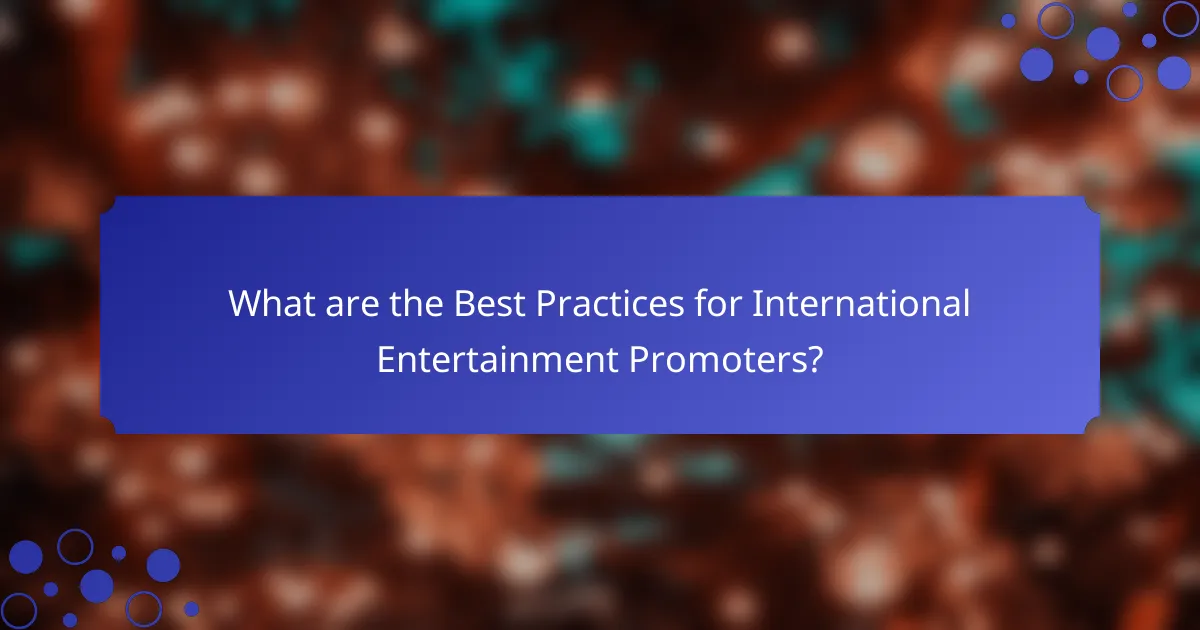
What are the Best Practices for International Entertainment Promoters?
International entertainment promoters should focus on strategic partnerships, market research, and audience engagement. Strategic partnerships enhance resource sharing and expand reach. Collaborating with local influencers can increase credibility and visibility. Market research helps identify target demographics and cultural nuances. Understanding local preferences ensures relevant marketing strategies. Audience engagement through social media fosters community and loyalty. Interactive content, such as polls and live Q&A sessions, boosts participation. Utilizing data analytics aids in measuring campaign effectiveness. These practices lead to successful international promotions, as evidenced by case studies of major events.
How can promoters effectively measure the success of their marketing techniques?
Promoters can effectively measure the success of their marketing techniques by utilizing key performance indicators (KPIs). KPIs such as sales growth, customer engagement, and return on investment (ROI) provide quantifiable metrics. For instance, tracking ticket sales before and after a campaign can indicate its effectiveness. Social media engagement rates can reflect audience interest and reach. Customer feedback surveys can offer insights into audience satisfaction. Additionally, analyzing website traffic can reveal the effectiveness of online promotions. These data points help promoters make informed decisions for future marketing strategies.
What metrics should be tracked for evaluating marketing effectiveness?
Key metrics to track for evaluating marketing effectiveness include return on investment (ROI), conversion rates, and customer acquisition cost (CAC). ROI measures the profitability of marketing expenditures. A higher ROI indicates effective marketing strategies. Conversion rates show the percentage of leads that become customers. Higher conversion rates reflect successful marketing campaigns. CAC calculates the cost to acquire each new customer. Lower CAC values suggest efficient marketing efforts. Additionally, tracking customer lifetime value (CLV) provides insight into long-term profitability. Monitoring engagement metrics, such as click-through rates and social media interactions, also reveals audience interest and campaign impact. These metrics collectively assess the overall effectiveness of marketing strategies.
How can feedback loops improve marketing strategies over time?
Feedback loops enhance marketing strategies by providing continuous insights into consumer behavior. These insights allow marketers to adjust tactics based on real-time data. For instance, analyzing customer responses to campaigns can reveal preferences. This data-driven approach increases engagement and conversion rates. A study by McKinsey found that companies using feedback loops saw a 20% improvement in marketing effectiveness. Regularly refining strategies based on feedback fosters adaptability. It also builds stronger customer relationships through personalized experiences. Ultimately, feedback loops create a cycle of improvement that aligns marketing efforts with audience needs.
What practical tips can enhance marketing efforts for international promoters?
Utilize social media platforms tailored to specific regions. Each region may favor different platforms, impacting engagement. Create localized content that resonates with cultural values. This increases relatability and audience connection. Collaborate with local influencers to enhance credibility and reach. Influencers have established trust within their communities. Employ targeted advertising based on demographic data. This ensures marketing messages reach the intended audience. Analyze performance metrics regularly to refine strategies. Data-driven decisions lead to improved outcomes. Attend international trade shows to network and showcase offerings. Face-to-face interactions can strengthen partnerships.
How can collaboration with influencers benefit marketing campaigns?
Collaboration with influencers can significantly enhance marketing campaigns. Influencers have established trust and credibility with their audiences. This trust translates into higher engagement rates for marketing messages. According to a study by Nielsen, 92% of consumers trust recommendations from individuals over brands. Influencers can reach targeted demographics effectively. Their followers often share similar interests, making campaigns more relevant. Collaborating with influencers can lead to increased brand awareness and visibility. A report from Influencer Marketing Hub states that businesses earn an average of $5.78 for every dollar spent on influencer marketing. These factors demonstrate the tangible benefits of influencer collaboration in marketing campaigns.
What strategies can ensure cultural relevance in marketing messages?
To ensure cultural relevance in marketing messages, brands should employ localized content strategies. This involves adapting messaging to resonate with specific cultural contexts. Research shows that 72% of consumers prefer ads tailored to their culture. Understanding local customs, language nuances, and social issues is essential. Collaborating with local influencers can enhance authenticity. Additionally, using culturally relevant imagery and symbols can strengthen connections. Regularly engaging with target audiences through surveys or feedback helps refine strategies. These approaches contribute to improved brand perception and customer loyalty.
Innovative marketing techniques for international entertainment promoters focus on leveraging social media, influencer partnerships, and data analytics to enhance audience engagement and drive ticket sales. The article explores how these modern strategies differ from traditional marketing methods, addressing unique challenges faced by promoters in diverse cultural landscapes. It highlights successful case studies, essential tools for implementation, and best practices for measuring marketing effectiveness. Additionally, it discusses the role of emerging technologies and the importance of cultural relevance in marketing messages to ensure successful international promotions.
